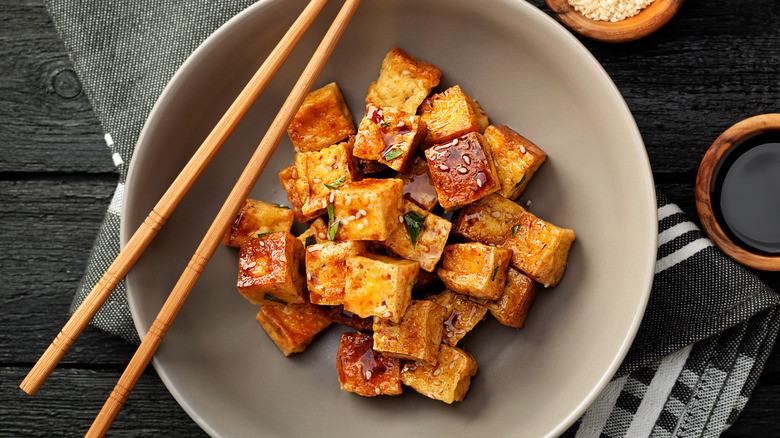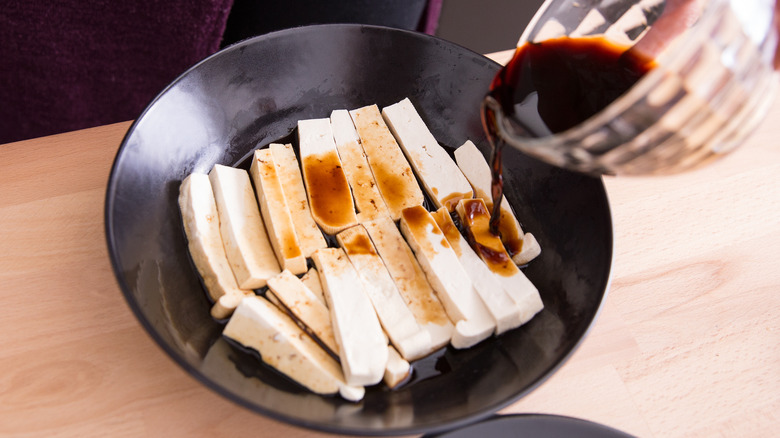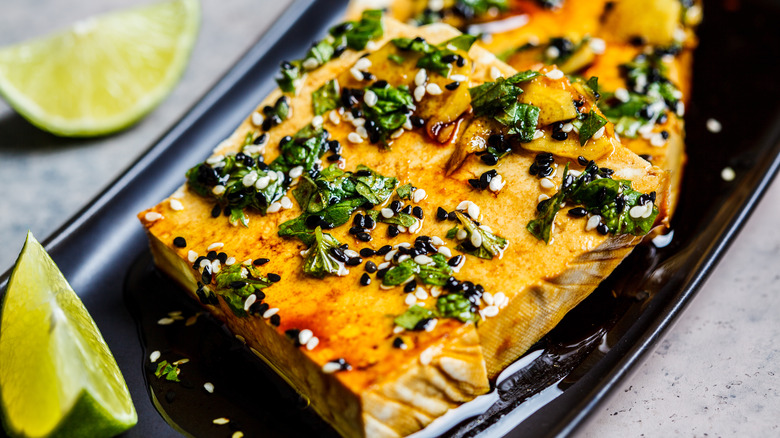For Perfectly Seasoned Tofu, Marinate Before And After Cooking
The history of tofu is an illustrated story, and its flexibility in many cuisines is unquestionable. It's craftily enhanced with the fruity flavors of Szechuan peppercorns, beautifully crusted with panko bread crumbs, and incredibly scrambled into the consistency of fluffy eggs. Although the humble tofu demonstrates such versatility, there remains potential for enhancing its flavor. What if the answer was to marinade it after cooking as well as before?
Placing this plant-based protein back into the marinade after it's hit the grill or crisped in a frying pan gives the tofu a chance to resoak and the flavors a chance to reload. It's almost like underlining a word you've written down — highlighting those aromas already embedded within the marinading process. It also has the strength to bring back some subtle flavor nuances that may have diminished when the tofu was heated.
Tofu can be marinated for at least 30 minutes before being cooked and then reintroduced to the marinade after to absorb more flavors. Another method for perfectly-seasoned tofu would be to stir cornstarch into the marinade while it's cooking. Then, once off the heat, pour this marinade and starch slurry into the pan with the tofu and let it reduce with the residual heat. A smooth and thickened sauce will be created. It takes little effort to achieve perfectly seasoned tofu; just don't throw out the marinade yet.
Which marinades work best?
This particular hack works with firm, extra-firm, or super-firm tofu varieties that have had some (or all) water pressed from their form. Pressing tofu is essential before marinating as it allows the tofu to make room to absorb the delicious seasoned mixture. Other varieties, such as silken (including firm silken), soft, or custard tofu, are considered beyond pressable. Their forms are too cream-like or will squish under any pressure.
It's also recommended that to achieve the best results with this double marinade, it's best to blot the tofu with a paper towel before it is cooked. A sweet marinade that has some degree of sugar (or syrup) may risk caramelizing when it comes into contact with heat, thus hardening the surface of the tofu and eliminating the possibility that the tofu will resoak the marinade when reintroduced.
It's also best to use frozen tofu that's been thawed. Freezing changes the texture and taste, which is immediately evident by its appearance in contrast to refrigerated tofu, which will have that slightly creamy surface. Frozen tofu looks like a sponge. As it thaws, the pockets of ice throughout the tofu melt, leaving behind small holes that are excellent for absorbing flavor and marinades.
Tips for making the best marinades
One of tofu's greatest gifts is its plain flavor, which allows a multitude of diverse marinades to unravel beneath its block-shaped exterior. Marinades typically contain oil, such as sesame, olive, or coconut, acidity like lemon juice or vinegar, and seasonings like spices and herbs. When selecting a marinade for tofu, it's worth reconsidering the oil element. As the marinade's oil interacts with the tofu's water content, it naturally creates a barrier, hindering the absorption of the marinade into the tofu.
Don't worry; omitting oil is not the end of the show. You may wish to form a simple marinade for stir-fries from umami-bursting soy sauce, sharp rice vinegar, sweet maple syrup, tangy garlic, and warm ginger. Tofu marinaded in funky nutritional yeast and rich soy sauce would pair well with a Thai-inspired curry or Buddha bowl. To hone in on Italian aromas, try instead a marinade that uses the sweet flavors of ground basil or the earthy tones of fresh oregano.
Whichever marinade you choose, make sure you use it before and after cooking your firm tofu. The results are as unquestionable as tofu's versatility.


